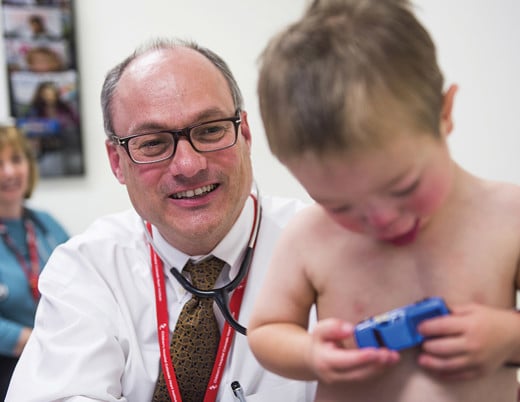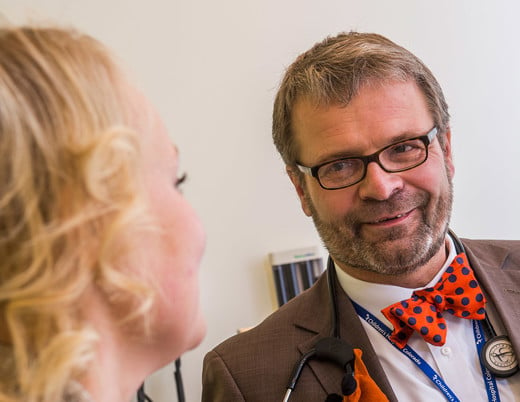How do Children's Hospital Colorado cardiac anesthesiologists make administering anesthesia safer for kids with a rare genetic disorder?
Only about 50 people in the world have been diagnosed with multisystem smooth muscle dysfunction syndrome, or MSMDS. Providers at Children’s Hospital Colorado have cared for four of them through 25 to 35 procedures. MSMDS is an incredibly rare genetic mutation that impacts actin, one of the key proteins that makes up smooth muscle throughout the body. As a result, patients experience complications anywhere smooth muscle is found, from their vasculature and intestines to their bladder and eyes. The condition is particularly tricky when it comes to pediatric anesthesia, something patients often need due to the complicated and widespread effects of MSMDS.
Risks while undergoing anesthesia among kids with MSMDS
The primary concern when it comes to administering anesthesia to kids with MSMDS is that anesthesia can cause changes in blood pressure. When a healthy child undergoes anesthesia, their body compensates for drops in blood pressure by signaling smooth muscle to squeeze. But because MSMDS weakens the smooth muscle in blood vessels, these patients are prone to dangerous blood pressure drops that reduce blood flow to their organs. What’s more, MSMDS often causes abnormalities of the blood vessels around the heart and to the brain, increasing patients’ risk of stroke or aneurysm while under anesthesia.
“These kids have extremely complex anatomy and physiology. So, we’ve got a child that’s going to need multiple anesthetics in their life and is at risk of complications during anesthesia,” says cardiac anesthesiologist Nicholas Houska, DO. “It’s really a perfect storm.”
Tailored pediatric anesthesia plans for kids with MSMDS
Because of this unique complexity, a patient’s multidisciplinary care team always includes a pediatric anesthesiologist like Dr. Houska or Richard Ing, MD. Their role is to not only create and implement tailored anesthesia plans for kids with MSMDS, but also to maintain communication with the various other specialists caring for each patient to make sure all concerns are addressed.
The work starts before surgery begins. The team consolidates as many procedures as possible into one single anesthesia experience and considers complications that could arise based on the patient’s current medical concerns and therapies. Additionally, the team works with caretakers to ensure patients get plenty of clear fluids before procedures, as dehydration can further lower blood pressure.
Drs. Houska and Ing also work with Children’s Colorado’s child life specialists to get an accurate blood pressure reading before administering anesthesia. The specialists help coach the patient to a calm state, which can be challenging given the stressful nature of procedures. This is critical, as knowing each child’s “normal” blood pressure allows the team to monitor changes once the patient is under anesthesia.
During the procedure itself, the anesthesiologist watches for changes in blood pressure, or signs of poor blood flow to organs such as the brain, lungs or kidneys. The work is complex, and with so few cases to study, it is particularly difficult to know what to expect. So far, the team has learned a significant amount through the various procedures they’ve assisted with on kids with MSMDS, and according to Dr. Ing, this experience combined with the team’s ability to seamlessly collaborate across disciplines has made a noticeable difference in care.
“What we do know is that when children with cardiac disease are cared for by a team that is trained in the multidisciplinary approach to congenital heart disease, the outcomes are usually a little better,” he says.
For these kids in particular, that experience has allowed cardiac anesthesiologists to better devise care plans that reflect each child’s individual needs, says Mark Twite, MD, Director of Pediatric Cardiac Anesthesia at the Children’s Colorado Heart Institute.
“It’s like tailoring a suit,” says Dr. Twite, who also serves as president of the Congenital Cardiac Anesthesia Society. “You have the same pattern for the suit, but a good tailor will trim it to fit you exactly.”
Sharing expertise and data
And because the team at Children’s Colorado has some of the most robust experience in the country treating kids with MSMDS, they are dedicated to sharing their knowledge with the larger community. Drs. Houska and Ing have published all their data, care recommendations and experiences working with these patients in a case review series that was shared in the Journal of Cardiothoracic and Vascular Anesthesia.
Ultimately, this highly specialized work, requiring quick thinking and a deep, involved understanding of each patient’s care across the spectrum of disciplines, is the work that Children’s Colorado’s pediatric cardiac anesthesiologists do best. The team of eight are committed to caring for the most complex cases, including kids with MSMDS.
“I think what distinguishes the pediatric cardiac anesthesia team is the acuity and the complexity of our patients,” Dr. Twite says. “Working together in a multidisciplinary team within the Heart Institute enables us to provide excellent perioperative care.”
Featured Researchers

Nicholas Houska, DO
Anesthesiologist
Children’s Hospital Colorado
Assistant professor
Anesthesiology-Pediatric Anesthesiology
University of Colorado School of Medicine

Richard Ing, MD
Director of Clinical Research Anesthesiology
Children’s Hospital Colorado
Professor
Anesthesiology-Pediatric Anesthesiology
University of Colorado School of Medicine

Mark Twite, MD
Director of Pediatric Cardiac Anesthesia
Children’s Hospital Colorado
Professor
Anesthesiology-Pediatric Anesthesiology
University of Colorado School of Medicine





 720-777-0123
720-777-0123










